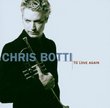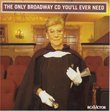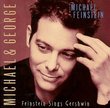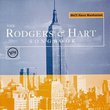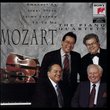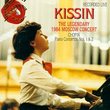| All Artists: Peter Ilyich Tchaikovsky, Felix Mendelssohn, Lang Lang, Daniel Barenboim, Chicago Symphony Orchestra Title: Tchaikovsky, Mendelssohn: First Piano Concertos Members Wishing: 0 Total Copies: 1 Label: Umvd Labels Release Date: 7/15/2003 Genre: Classical Styles: Forms & Genres, Concertos, Instruments, Keyboard, Symphonies Number of Discs: 1 SwapaCD Credits: 1 UPCs: 028947429128, 002894742912 |
Search - Peter Ilyich Tchaikovsky, Felix Mendelssohn, Lang Lang :: Tchaikovsky, Mendelssohn: First Piano Concertos
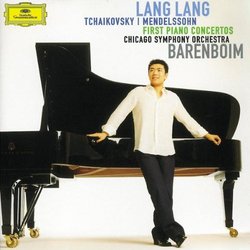 | Peter Ilyich Tchaikovsky, Felix Mendelssohn, Lang Lang Tchaikovsky, Mendelssohn: First Piano Concertos Genre: Classical Barely out of his teens on this recording, Lang Lang demonstrates plenty of virtuoso finger dexterity, but also places his personal stamp on the music. In the Tchaikovsky, a barn-burner of a piece that some pianists use to... more » ![header=[] body=[This CD is available to be requested as disc only.]](/images/attributes/disc.png?v=a4e11020) ![header=[] body=[This CD is available to be requested with the disc and back insert.]](/images/attributes/disc_back.png?v=a4e11020) ![header=[] body=[This CD is available to be requested with the disc and front insert.]](/images/attributes/disc_front.png?v=a4e11020) ![header=[] body=[This CD is available to be requested with the disc, front and back inserts.]](/images/attributes/disc_front_back.png?v=a4e11020) |
Larger Image |
CD DetailsSynopsis
Amazon.com Barely out of his teens on this recording, Lang Lang demonstrates plenty of virtuoso finger dexterity, but also places his personal stamp on the music. In the Tchaikovsky, a barn-burner of a piece that some pianists use to show how fast and loud they can play, Lang stresses the layers of intimacy alongside its more extroverted passages, which he plays with plenty of pianistic pyrotechnics. If his first movement seems disjointed, more a fantasia than a cohesive entity, he makes a virtue out of necessity through sharp accents that highlight its episodic character. Barenboim and the Chicago Symphony's brilliantly played accompaniments are in synch with Lang's approach. The Mendelssohn is a work that replaces bombast with elegant sparkle well suited to Lang's strengths. Lang is in his element here, sprinkling notes without breaking a sweat. There's stiff competition from classic performances by Argerich and Cliburn among many others in the Tchaikovsky, and Serkin, Schiff, and Thibaudet in the Mendelssohn, but Lang is well worth hearing. --Dan Davis Similarly Requested CDs
|
CD ReviewsBarenboim is the Bonynge to Lang's Sutherland J R Sound Police | California | 05/13/2008 (3 out of 5 stars) "It is ashamed that a conductor with a steadier sense of rhythm was not chosen for the Tchaikovsky. The melodic line frequently deflates due to constant (not so subtle) changes that do not seem to have a songful, expressive purpose. Just as Joan Sutherland was at her droopiest when conducted by Richard Bonynge (and conversely at her best with other conductors who were not so indulgent), Lang needs someone to help keep the music on track. The Mendelssohn seems better because each movement (whether or not played faster or slower than normal), seems to be all of a piece, held together with a somewhat clearer sense of line. The sound of the piano backed by the orchestra is also better balanced in the Mendelssohn." Would Lang's 'strangeness' withstand the test? Abel | Hong Kong | 12/10/2007 (4 out of 5 stars) "On the tombstone of Edgar Alan Poe is written "There is no exquisite beauty without strangeness in dimension". The importance of novelty, some thing that demands a willingness to take risks, can never be over-emphasized in artistic endeavours.
I for one don't think Lang Lang is oblivious to the criticisms he is facing. Perhaps the best reaction an artist can make in the wake of such is `to be himself'. True that he fails to impress the `purists'. Given his unique musical upbringing (in a family that pursued traditional Chinese music as career, and with very little formal Western training before he goes to Philadephia), there is forever evident in Lang Lang's pianism the traces of Chinese musical influence. Take the Tchaikovsky No. 1 Concerto's second movement. The slow section begins with a wonderful woodwind section, taken up soon by the piano. The style deployed by Lang Lang transforms the entire movement to a rare lyrical experience, one that could only be found in traditional Chinese music. He does not `copy and paste' forerunners' interpretation, but comes up with his own musical experience. Such synthesizing is of course novel, but conventionalists and purists may have much more to criticise Lang's approach as being `boring', `flat', or what not. To what degree the truth stated in Poe's eulogy applies to Lang remains a matter of controversy these years. A conventional view of these two concerti would of course be most willing to point out the third movement of the Tchaikovsky First Concerto, as well as the first movement of the Mendelssohn First Concerto, as being `under-powered' by excessive rubato tempi, and excessive freedom in dynamics. There is another `strangeness' linked with the conductor Daniel Barenboim in these. It is evident that in this particular recording he and Lang Lang are much in sync. Barenboim, it would never be forgotten, is the conductor for Jacqueline du Pre's Haydn cello concerti. These recordings, strictly taken, aren't conventional readings that would meet with the purists' ears. Even so, those have become a `classic' in their own right over the years. Lang may take a long time to establish his own acceptance by classical purists. It is fortunate that he is only 25." |

